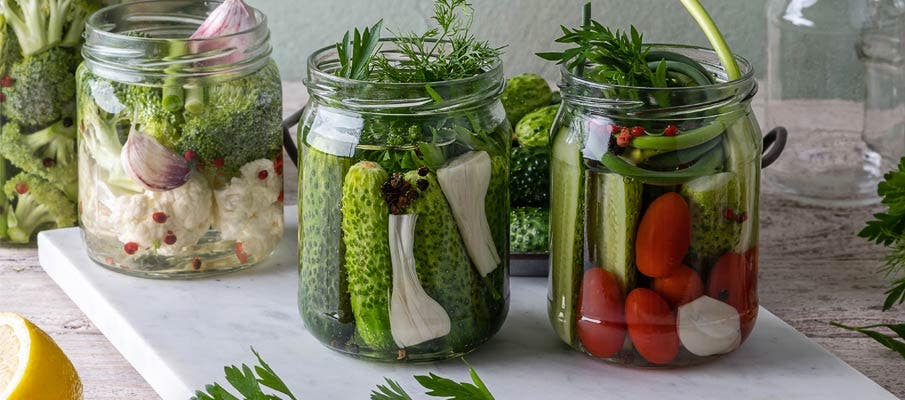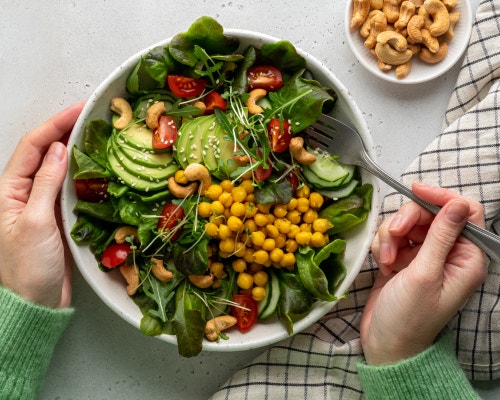Should You Add Fermented Foods to Your Diet?
- 7/17/23


Probiotics have been a buzzworthy term in the wellness community for years. While many people turn to probiotic supplements to support digestion and overall health, you can get the same benefits by eating fermented foods. Fermented foods aren’t a food group but a class of foods that naturally contain probiotics and are produced through the process of fermentation.
If you’re trying fermented foods for the first time, you might wonder where to start and how much to eat. Below you’ll find everything you need to know, from fermentation basics to examples of fermented foods and why they deserve a place on your plate.
What Is Fermentation?
Fermentation is a method of food preservation that uses bacteria and/or yeast to break down naturally occurring starches and sugars in various foods. The process results in the growth of live bacterial cultures or probiotics — AKA good-for-you bacteria — plus a tangy taste and longer shelf-life in the finished foods.
Historically, fermentation has been used by many cultures around the world to extend the life of fresh foods, such as fruits, vegetables, lean meats, dairy, and soybeans. Some fermented foods are made by adding bacterial cultures to them, while others are fermented from naturally-occurring microorganisms present in the food.
Examples of Fermented Foods and How to Use Them
You can find many fermented foods in your grocery store, including this list of fermented foods:
- Cottage cheese
- Kefir
- Kimchi and other fermented veggies
- Kombucha
- Miso
- Natto
- Pickles
- Raw cheese
- Sauerkraut
- Tempeh
- Yogurt
You’ll notice some of the above foods, like pickles and sauerkraut, are often available in both refrigerated and shelf-stable forms. The shelf-stable versions are typically preserved with vinegar, which is an acid and doesn’t add beneficial bacteria to the end product. Choose refrigerated versions of these foods when possible, as they are more likely to have been preserved via bacterial fermentation and contain probiotics.
If you’re unsure if a food is fermented and/or contains probiotics, look for “naturally fermented” or “active cultures” on the label or ingredient list. You can also find simple recipes to make your own fermented vegetables and sauerkraut with fresh produce, water, and salt. Be sure to follow recommended safety practices when fermenting foods at home.
Fermented dairy products and beverages can be enjoyed on their own, while a spoonful of fermented vegetables, kimchi, or sauerkraut makes an excellent fresh and flavorful topping for salads, grain bowls, ramen, and sandwiches.
Miso, natto, and tempeh are fermented soybean products that can be used in various dishes. Miso can be added to soups, sauces, and salad dressings, and natto can be eaten as is over rice or grain bowls. Tempeh can be sauteed or stir-fried and used as a plant-based meat alternative, similar to tofu. However, applying heat to probiotic-containing foods can destroy the beneficial bacteria. While these foods are still nutritious, including a daily serving of an uncooked fermented food will offer the most benefit.
Benefits of Fermented Foods
Research shows regular consumption of fermented foods can help support digestive health, immunity, and brain health.
Supports digestive health
The probiotic content of these foods can help balance and maintain the population of beneficial bacteria in your digestive environment. Probiotics play a role in breaking down food, nutrient absorption, and even synthesizing some vitamins.
Studies have linked probiotic intake with fewer incidences of digestive issues like bloating, gas, irregularity, and poor stool consistency.
Supports immune system function
Research has linked the gut microbiome to the immune system. Studies show eating fermented foods boosts immune system function and lowers inflammatory markers.
Supports brain health
Scientists have discovered a link between the health of your microbiome and central nervous system function, known as the gut-brain axis. Growing research shows that probiotics from fermented foods can influence the production of neurotransmitters and other brain compounds that regulate mood and memory.
Bottom Line
Fermented foods are a nutritious and delicious way to support gut health and digestion. Enjoying a daily serving of fermented foods provides probiotics, a good kind of bacteria supporting a balanced microbiome in your intestines. Since the digestive environment is linked to immune system function and brain function, probiotics can also support whole-body well-being.
References:
-
Leeuwendaal NK, Stanton C, O'Toole PW, Beresford TP. Fermented Foods, Health and the Gut Microbiome. Nutrients. 2022;14(7):1527. Published 2022 Apr 6. doi:10.3390/nu14071527
-
Stiemsma LT, Nakamura RE, Nguyen JG, Michels KB. Does Consumption of Fermented Foods Modify the Human Gut Microbiota?. J Nutr. 2020;150(7):1680-1692. doi:10.1093/jn/nxaa077
-
Markowiak P, Śliżewska K. Effects of Probiotics, Prebiotics, and Synbiotics on Human Health. Nutrients. 2017;9(9):1021. Published 2017 Sep 15. doi:10.3390/nu9091021
-
Varsha KK, Narisetty V, Brar KK, et al. Bioactive metabolites in functional and fermented foods and their role as immunity booster and antiviral innate mechanisms [published online ahead of print, 2022 Jun 24]. J Food Sci Technol. 2022;1-10. doi:10.1007/s13197-022-05528-8
-
Kim B, Hong VM, Yang J, et al. A Review of Fermented Foods with Beneficial Effects on Brain and Cognitive Function. Prev Nutr Food Sci. 2016;21(4):297-309. doi:10.3746/pnf.2016.21.4.297





